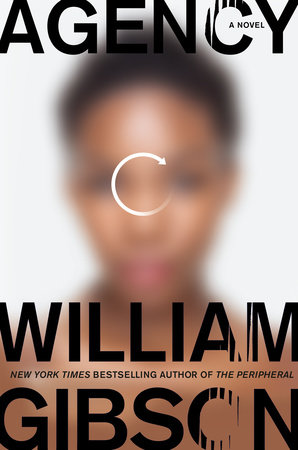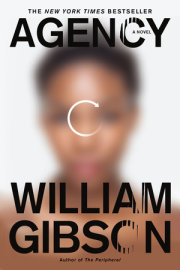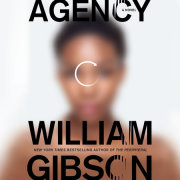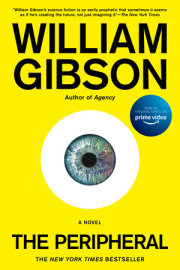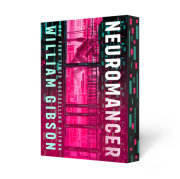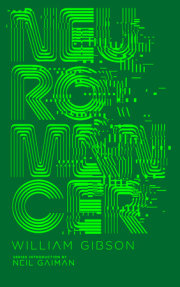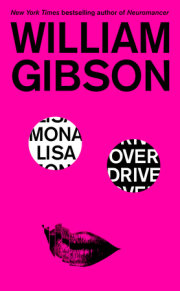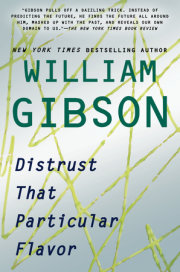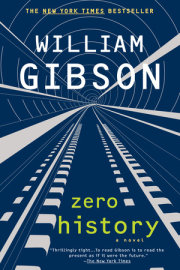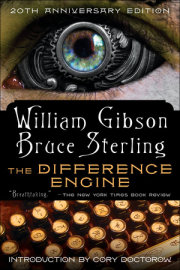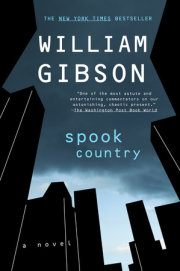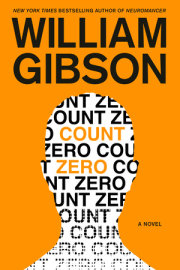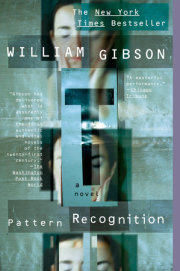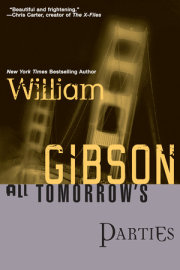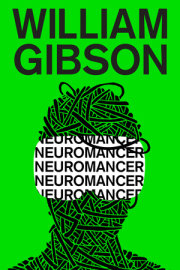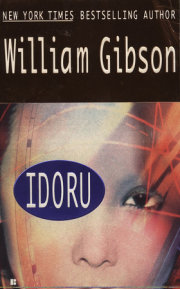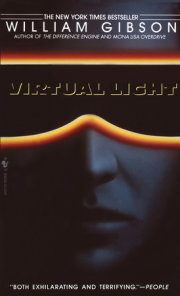AGENCY by William Gibson1
The Unboxing
Very recent hiredness was its own liminal state, Verity reminded herself, on the crowded Montgomery BART platform, waiting for a train to Sixteenth and Mission.
Twenty minutes earlier, having signed an employment contract with Tulpagenics, a start-up she knew little about, followed by a wordy nondisclosure agreement, she'd shaken hands with Gavin Eames, their CTO, said goodbye, and stepped into an elevator, feeling only relief as the doors closed and the twenty-six-floor descent began.
New-job unease hadn't yet found her, there, nor out on Montgomery as she'd walked to the station, texting her order for pad thai to the Valencia branch of Osha. By the time she'd reached this platform, though, three flights down, it was entirely with her, as much as the black trade-show bag slung beneath her arm, silk-screened with the logo of Cursion, her new employer's parent firm, about which she knew very little, other than that they were in gaming.
It was with her now as her train arrived. Almost two years since she'd felt this, she thought, as she boarded. She'd been unemployed for half of that, which she supposed might account for its intensity now.
She reached for a hang-strap as the car filled.
Surfacing at Sixteenth, she went straight to Osha, picked up her pad thai, and started for Joe-Eddy's.
She'd eat, then start getting to know their product. This wasn't just a new job, but a possible end to sleeping on Joe-Eddy's curb-rescue porn couch.
The early November sky looked almost normal, Napa-Sonoma particulates having mostly blown inland, though the light still held a hint of that scorched edge. She no longer started awake to the smell of burning, only to remember what it was. She'd kept the kitchen window closed, this past week, the only one Joe-Eddy ever opened. She'd give the place a good airing soon, maybe try cracking one of the windows overlooking Valencia.
Once back at his apartment, she ate hungrily from the black plastic take-out tray, ignoring the lingering reek of the uncut Mr. Clean she'd used to scour the wooden tabletop, prior to Gavin's call. If Joe-Eddy's Frankfurt job lasted, she remembered having thought as she'd wielded a medium-grit 3M foam sanding block, she might scrub the kitchen floor as well, for the second time in a little under a year. Now, though, with Tulpagenics' contract signed, she might be giving notice to the couple renting her condo, middle managers at Twitter, who hadn't reported a paparazzi sighting for over three months. In the meantime, for however many more nights on white pleather, she had her silk mummy-bag liner, its thread-count proof against the porn-cooties of persistent imagination.
Covering what remained of her order with its admirably compostable translucent lid, she stood, took her leftovers to the fridge, rinsed her couch-surfing chopsticks at the sink, and returned to the table.
When Gavin had been packing the bag, the glasses were all she'd paid any real attention to. They'd involved a personal style decision: tortoiseshell plastic, with gold-tone trim, or an aspirationally Scandinavian gray. Now she took their generic black case from the bag, opened it, removed them, and spread the pale gray minimalist temples. The lenses were untinted. She looked for a trademark, country of origin, model number. Finding none, she placed them on the table.
Next, a flat white cardboard box, in which a flimsy vacuum-formed tray, also white, hugged a nondescript black phone. Likewise no-name, she found, having freed it from the tray. She turned it on and placed it beside the glasses. A smaller white box revealed a generic-looking black headset with a single earbud. In another, three black chargers, one each for the glasses, phone, and headset, commonest of consumer fruit, their thin black cables still factory-coiled, secured with miniature black twist-ties. All of it, according to Gavin, plug and play.
Picking up the headset and switching it on, she hung it from her right ear, settling the earbud. She put the glasses on, pressing their low-profile power-stud. The headset pinged, a cursor appearing. A white arrow, centered in her field of vision. Then moving down, of its own accord, to the empty boxes, the chargers, the black phone.
"Here we go," said a woman's husky voice in Verity's ear. Glancing to her right, toward what would have been the voice's source had anyone been there, Verity inadvertently gave whoever was controlling the cursor a view of the living room. "Got a hoarding issue, Gavin?" the voice asked, the cursor having settled on the miniature junkyard of semi-disassembled vintage electronics on Joe-Eddy's workbench.
"I'm not Gavin," Verity said.
"No shit," said the voice, neutrally.
"Verity Jane."
"Ain't the office, is it, Verity Jane?"
"Friend's place."
The cursor traversed the living room, to the closed curtains. "What's outside?"
"Valencia Street," Verity said. "What should I call you?"
"Eunice."
"Hi, Eunice."
"Hi yourself." The cursor moved to Joe-Eddy's Japanese faux Fender Jazzmaster. "Play?"
"Friend does. You?"
"Good question."
"You don't know?"
"Thing-shaped hole."
"Excuse me?"
"I got one, in that department. Want to show me what you look like?"
"How?"
"Mirror. Or take the glasses off. Point 'em at your face."
"Will I be able to see you?"
"No."
"Why not?"
"No there there."
"I need to use the bathroom," Verity said, standing. "I'll leave the glasses here."
"You don't mind, maybe open the drapes."
Verity crossed to the window, hauled both layers of dusty blackout curtain aside.
"You put the glasses down," the voice said, "I can look out the window."
She took them off, positioning them, temples open, lenses overlooking the street, on a white Ikea stool, its round seat branded with soldering-iron stigmata. Then added, for what she judged to be needed elevation, the German-language making-of volume of a Brazilian telenovela. Removing the headset, she put it down on the book, beside the glasses, went to the kitchen, retrieving her own phone from her purse, then down the narrow corridor to the bathroom. Closing the door behind her, she phoned Gavin Eames.
"Verity," he answered instantly, "hello."
"Is this for real?"
"You haven't read the nondisclosure agreement?"
"More clauses than I'm used to."
"You agreed not to discuss anything of substance on a non-company device."
"Just tell me there's not someone somewhere doing Eunice, for my benefit?"
"Not in the sense I take you to mean, no."
"You're saying it's real."
"Determining that to your own satisfaction is part of what you're expected to be doing for us."
"Should I call back on the company phone?"
"No. We'll discuss this in person. This isn't the time."
"You're saying she's-"
"Goodbye."
"Software," she finished, looking from the phone to her reflection in the mirror over the sink, its age-mottled silver backing suggesting a submarine grotto. She turned then, opened the door, and walked back into the living room, to the window. Picked up the glasses. Put them on. Late-afternoon traffic strobed behind transparent vertical planes of something resembling bar code. "Whoa . . ."
Then she remembered the headset. Put it on.
"Hey," the voice said.
The bar code vanished, leaving the cursor riding level with the windows of passing cars. "What was that?" Verity asked.
"DMV. I was reading plates."
"Where are you, Eunice?"
"With you," said the voice, "looking out the window."
Whatever this was, she knew she didn't want her first substantial conversation with it to take place in Joe-Eddy's living room. Briefly considering the dive bar on Van Ness, not that she felt like a drink, she remembered having recently been recognized there. There was Wolven + Loaves, a few doors up the street, but it was usually busy, the acoustics harsh even when it wasn't. Then she remembered 3.7-sigma, Joe-Eddy's semi-ironic caffeination-point of choice, a few blocks away, on the opposite side of Valencia.
Copyright © 2020 by William Gibson. All rights reserved. No part of this excerpt may be reproduced or reprinted without permission in writing from the publisher.

